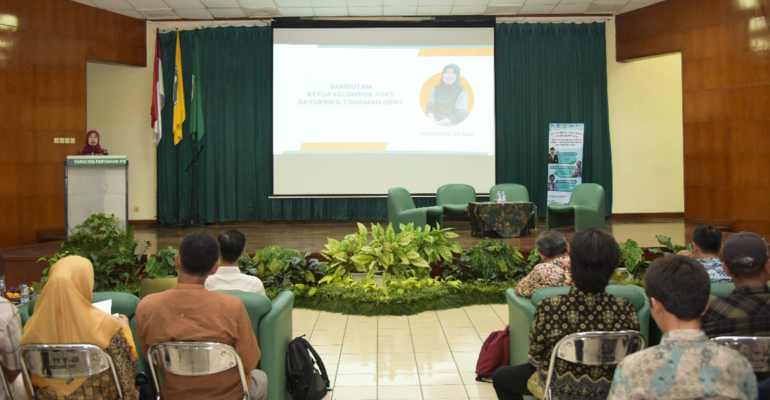No Longer Using Pesticides, Chili Farmers Recognize the Benefits of IPB University Innovation Intensive Microbial Technology

Chili farmers from six agricultural regions, namely Gowa, Kediri, Bantul, Tegal, Pandeglang and Garut, welcomed and were satisfied with the technological innovation created by Professor of the Faculty of Agriculture, IPB University, Prof Suryo Wiyono.
The technology in question is intensive microbial technology for chili cultivation. On this basis, they attended the Results Dissemination, Knowledge Sharing and Intensive Microbial Technology Product Exhibition for Chili Cultivation.
The event was organized by Faperta IPB University together with the Directorate General of Horticulture, Ministry of Agriculture (Kementan) and is part of the Kedaireka program of the Ministry of Education, Culture, Research and Technology (Kemendikbudristek). The event was held at the Toyib Hadiwijaya Auditorium, IPB Dramaga Campus, Bogor (8/12).
Farmers are now confident that without pesticides farmers can grow chilies with satisfactory production results. This was conveyed by one of the farmers from Garut. Apart from that, the desire to be facilitated with technology was also expressed by chili farmers from Gowa, South Sulawesi. According to him, farmers’ knowledge of intensive microbial technology for chili cultivation is still minimal in their area.
Prof Suryo Wiyono, Dean of Faperta IPB University and chairman of the research team said that intensive microbial technology is a chili cultivation technology package with the help of selective microbes to control pest attacks.
“Apart from being efficient, this technology can also increase production yields and is environmentally friendly because it leaves no residue and does not use pesticides. “Intensive microbial technology for chili cultivation is a technology that can be a solution to future chili production challenges,” he explained.
Prof Suryo further said that the use of pesticides to eradicate pests and diseases of chili plants is ineffective and not environmentally friendly. However, currently there are still many farmers who still use pesticides.
“Through this event we want to disseminate to various groups that there is now an innovation in intensive microbial technology for effective chili cultivation with high productivity, efficiency and environmental friendliness and has been proven,” he said.
“We are ready to collaborate with various groups, government, industry and especially farmers. “We have conducted research and it has been proven and economically and technically feasible,” added Prof Suryo.
Meanwhile, Wita Khairia, Chairman of the Group of Officers for Controlling Plant Pest Organisms (POPT) for Vegetables and Medicinal Plants, said, “We from the Directorate of Horticultural Protection would like to thank you for the assistance and improving the quality of services provided by IPB University.”
He added, with the production of chilies that are safe for consumption that are free of pesticide residue, he hopes that in the future there will be other collaborations as a follow-up to the reflection on intensive microbial technology activities.
Apart from farmers, the event was also attended by various groups, from students, academics, business people to agricultural instructors. (dh/Rz) (IAAS/Res)



